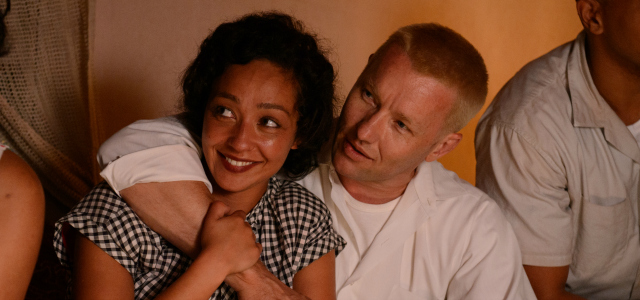Loving
Nichols eschews the typical ‘historical drama’ pitfalls and favours something more raw and down-to-earth.
Plot summary
Covering the events leading up to the 1967 Supreme Court case, the film tells the story of Richard and Mildred Loving. After venturing out of Virginia for a shotgun wedding, the couple return to be incarcerated by local law enforcement for flouting interracial marriage laws. Their ruling banishes them from the state for 25 years, leading them to set up a home in Washington. When the unpredictability of city life and a longing to be back with family forces the Lovings to return, though, the wheels begin to turn in what would become one of the most important legislative breakthroughs in the Civil Rights movement.

‘I’m pregnant,’ states Mildred (Ruth Negga) in the opening scene of Jeff Nichols’ gorgeous fifth feature. After a long pause, her husband Richard (Joel Edgerton) replies with comforting simplicity: ‘That’s good.’ Throughout the many confrontations with the law, a period in fraught exile from Virginia and a truly historical court case, Loving never strays from the sincerity of this opening exchange. Mr and Mrs Loving may find themselves perpetually fighting against forces of hate, both social and institutionalised, but such bigotry never makes them question the legitimacy of their relationship. Or, more specifically, their love for one another.
Nichols’ dramatisation of events leading up to a landmark 1967 court ruling excels precisely because of this simplicity. Under his steady directorial hand and two spellbinding lead performances, it’s blindingly obvious that regressive interracial marriage legislation is in desperate need of being overturned. These are just two people who have a strong connection and want to start a life together. As Richard himself points out, they aren’t hurting anyone. How on earth can that possibly be a crime?
It’s impressive that Nichols manages to convey this message without straying towards heavy-handedness. What’s really special about Loving, though, is how its emotional resonance is achieved with nary an Oscar-baiting trick in site. There are no histrionic fits of Big Moment acting, no sweeping crane shots accompanied by orchestral crescendos and no audience-friendly shots of catharsis. The matter-of-factness that defines the director’s style eschews the typical ‘historical drama’ pitfalls and favours something more raw and down-to-earth. He frames his action with a humble lightness, seemingly at pains to appear as objective as possible and present the lives onscreen as they were. It’s been stated in interviews that Nichols was committed to historical accuracy in the name of presenting something ‘authentic and true’, and that certainly shows.
Of course, Nichols doesn’t need cheap Hollywood cheats when the lives he’s documenting are being brought to life by Edgerton and Negga. Communicating through a series of stolen glances, whispered sweet nothings and declarations of love, the two ground the romance in a salt-of-the-earth sweetness that doesn’t require elaboration. We don’t need to see their meet-cute, for instance, or witness some impassioned courtroom monologue. All we need is a snapshot of what’s at stake, something that lends a warm humanity to what could so easily have been a sterile history lesson. The restraint needed for their technique is staggering, but it’s one that subtly builds power and culminates in a climax bursting with repressed tears.
Loving may well clean up come Oscar season. Or it might fly too delicately to appear on the radar. Either way, it doesn’t really matter. For the ravishing two hours in which these lives occupy the screen, we believe their plight. Its achievements as cinematic expressions speak for themselves.










COMMENTS